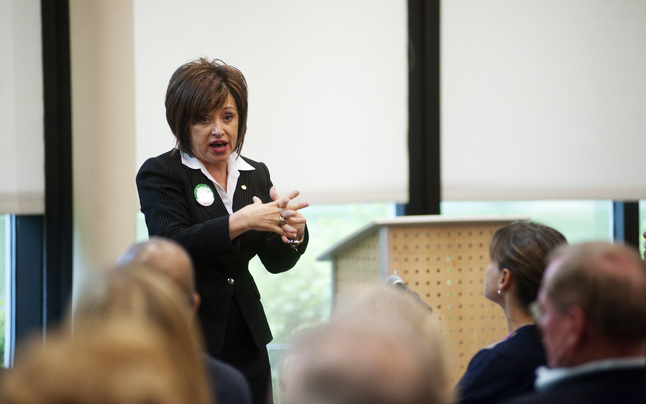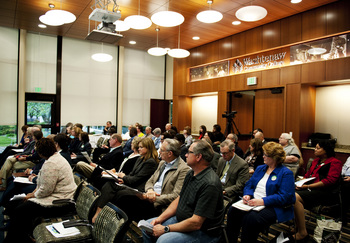
Washtenaw Community College President Rose Bellanca speaks in the Morris Lawrence building on Tuesday, May 14.
Daniel Brenner I AnnArbor.com
As Washtenaw Community College sets into motion a strategic plan intended to strengthen the college's regional profile, some faculty members are wondering how involved they'll be in decisions that will shape the school's future.
A group of faculty, including the leadership of the faculty union and several department chairs, has been at odds with WCC President Rose Bellanca in recent months, and both parties say they hope an improved relationship can lead to a positive trajectory for the college as it implements a plan that's taken more than a year to devise.
"Things are moving in a better direction," said Marvin Boluyt, co-chairman of WCC's life sciences department. "This has been the best place I've ever worked. It's a fabulous work environment surrounded by happy, optimistic, can-do people. So this winter that atmosphere was definitely affected."
A large group of WCC's roughly 190 full-time faculty members began publicly expressing frustration with Bellanca's leadership style this winter. The faculty union was unhappy with a perceived lack of communication from Bellanca and complained instructors were being shut out of major decisions. Department chairs wanted to meet with Bellanca in one large meeting, but she insisted on meeting in small groups, which vexed some faculty members.
Some were also concerned by a few of Bellanca's initiatives, including plans to offer late-starting classes and increase WCC's offerings to local high schoolers. When Bellanca went ahead with changes in these areas, faculty representatives said she made a top-down decision and expressed concern over the direction of the college. Faculty wanted more input on hires to WCC's leadership team.
Issues came to a head when Bellanca fired Stuart Blacklaw, the school's vice president of instruction, in March.
Stunned by the firing, faculty went on the offense. Roughly 100 faculty members signed a petition seeking improved communication with college administration on April 23. That came after the faculty leadership submitted a formal list of complaints in February.
"Change happens. It's not that we're really afraid of changes. It's that we're afraid of changes that might not be good ones," said Rosemary Rader, a chemistry instructor. "If we haven't been involved in the process of figuring out those changes, it's really hard to embrace them."
New efforts
Since then, Bellanca has promised to step up her level of communication.
"I've met with the department chairs as a whole, I've invited them here tonight. I try to send them updates on what's going on in the college," she said after a Board of Trustees meeting Tuesday, saying that communication with faculty is improving. "I just try my best to do whatever it takes."
Though she acknowledged as president she makes the final decision on major matters affecting the college, she said she does seek faculty input.
"At some point you say 'I don't think we're going to go left, I think we're going to go right.' I am in charge, I make the decision but I am open to input," Bellanca said in a late March interview. "Not everybody has to be involved in a decision because sometimes that would take forever and a day. But I do believe the people who are most impacted by that decision have some input."
Some faculty members say there have been small improvements. After listening to faculty concerns, she allowed the student newspaper to print a summer edition, which it originally been prohibited from doing this summer. She's begun sending email updates to faculty, and she went to the meeting with department chairs.
"She promised to improve collaboration and communication," said Carrie Krantz, chairwoman of WCC's English department. Krantz said that while such promises are positive, faculty are looking at Bellanca to follow them through.
"I haven't seen any evidence of it and I haven't seen any evidence of anything going wrong," Krantz said.
Washtenaw Community College Profile
Bellanca in February announced a new advisory academic cabinet comprised of deans and select department chairs and faculty. Yet union leaders said they, along with department chairs, weren't consulted before she announced the cabinet.
David Fitzpatrick, chief negotiator for the faculty union, said that in a recent meeting with Bellanca she addressed faculty concerns piece-by-piece and had adopted a more positive tone with the union's leadership team.
"To her credit she laid out what she was doing to address issues. Of course, those issues arose because she didn't work with us to begin with," Fitzpatrick said.
Fitzpatrick says that while there have been improvements, he believes faculty is still not being fully informed about college initiatives. After hearing recently that WCC administrators were looking for ways to partner with a college in China, Fitzpatrick said he asked for details and didn't receive any.
"Things are improving, but the fundamental problem remains, and that is that there's a lack of communication about the projects and initiatives that the college is undertaking," he said. Fitzpatrick added that although details of the strategic plan were released Tuesday, for many months he was in the dark about the overarching goals of the plan.
The fall semester and the implementation of the strategic plan, faculty members say, will show if communication between administrators and faculty has improved. The faculty also wants to be intimately involved in the search for a new permanent vice president of instruction, and Bellanca has promised a collaborative search.
"We'd like to be able to say that there's been a track record of collaboration and so far we have the idea of collaboration and a spoken commitment to collaboration, but we'd like to actually have something to say 'Yes, that was a collaborative moment,' and we haven't had that yet," said Jason Withrow, a faculty member who has served on the strategic planning committee.
"The strategic plan has the potential to be really positive, but it depends on how it's implemented," Withrow continued. "If faculty are brought in and have a voice and have a strong role to play in it, then I think that's a very positive step. But if faculty are sidelined, then it's going to be very problematic going forward."
English instructor Sue Glowski put it bluntly: "Proof is in the pudding."
Strategic plan

Washtenaw Community College faculty, administrators and staff listen as details of the school's strategic plan are unveiled during a meeting in the Morris Lawrence building on Tuesday, May 14.
Daniel Brenner I AnnArbor.com
About seven faculty, and just as many staff, have been involved in crafting the parameters of the strategic plan. The majority of the plan committees are co-chaired jointly by an administrator and a faculty member. Staff and faculty were invited to participate in focus groups and fill out surveys about the college's future direction.
Bellanca said these measures are evidence of collaboration.
The plan is broad in scope. It includes blueprints for an entrepreneurship center, a centralized internship program and a center to lure more high schoolers to the college. It overhauls academic advising, emphasizes workforce development and establishes a college resource that aids instructors who want to experiment with their curriculum. It seeks to develop a fundraising campaign and increase grant requests to the National Science Foundation.
Bellanca said that now that the college is moving to the implementation phase of the plan, she's looking to college employees —and not outside experts— to lay the foundation and put it in place.
"It's all theirs, it's theirs ... faculty and staff," Bellanca said of the strategic plan after a WCC Board of Trustees meeting Thursday. "Everyone here is a part of this plan."
Bellanca joined WCC in fall 2011. She previously served as the provost and chief operating officer of Northwood University's Florida campus, president of St. Clair County Community College and provost of Macomb Community College. According to her personnel file, she earns $195,000.
When she arrived at WCC, enrollment was declining —there was a decline of nearly 10 percent in fall 2011, after years of increases. State funding for community colleges and public universities was cut by 15 percent.
Faculty members say the campus is healing after the firing in March of Blacklaw, the vice president of instruction who was hired by former president Larry Whitworth in 2010, and the sudden resignation of Steven Hardy, the chief financial officer, in November. They say the departures made employees distrustful of Bellanca's administration.
"The way [Blacklaw] was fired was ridiculous: the fact that he was fired when the faculty had been pushing very hard for them just to work together better," said Boluyt.
Julie Kissel, an English instructor who serves on the strategic planning committee, said the firing undermined faculty members' trust in Bellanca.
Bellanca has declined to comment on Blacklaw's departure specifically, but a review of his personnel file reveals a deteriorating relationship between WCC's two top leaders.
"I've lost confidence in Stuart's ability to lead and communicate with me in confidential matters when needed. The faculty and deans know that he does not support the president and believe there is conflict between us," Bellanca wrote in Blacklaw's June 2012 personnel review. "As president, I believe that having a positive culture to work and learn in is very important. Unfortunately, the deans or faculty members are not aware that their issues are not researched and presented as thoroughly as they could be and because of that they often receive an unfavorable answer."
In a written response to Bellanca's evaluation, Blacklaw wrote that administrators "cannot move an organization through intimidation" and that "those who empower and respect their staff get better performance in return."
In a late March interview, Bellanca said that when administrators aren't supportive of one another, the discontent reverberates throughout the organization.
"It's not any different from a sports team," she said. "You have to know that the person sitting next to you, that they're going to rely on each other. It's really hard to build a team if people don't feel committed to each other and just to where we are going."
Boluyt said that as the college moves forward with the interim vice president of instruction, Bill Abernethy, who is well-liked by instructors, he's hopeful that angered faculty can regain trust in Bellanca.
"We have an open mind. We're skeptical. We're not going to be convinced until we see the evidence," he said. "There's going to be an adjustment period [when a new president enters the college] but I think [the issues were about] more than that. Whether it continues to be more than that, we'll see."
The Board of Trustees, WCC's elected governing body, has publicly expressed confidence in the president. In an open letter released in late April, board chairwoman Anne Williams, on behalf of the board, said "there is clear evidence of [Bellanca's] efforts to commentate and collaborate."
"We are very aware that she has attended nearly 400 meetings with executive leadership, faculty, deans, chairs, the liaison team, union representatives, students and external constituencies," Williams wrote. "We are confident that the combination of continued strong performance from President Bellanca and her ongoing efforts to work with the college's faculty and staff members will help to ease some of the disconnect we have seen in recent weeks."
In an interview Tuesday, Trustee Diana McKnight-Morton said that at some point every college experiences a "bump in the road."
Trustee Stephen Gill said Bellanca, through the strategic plan, is trying to "get everybody on board to work across departments and disciplines." He said the plan "gives everybody a common direction," which could heal divides in the college.
Kellie Woodhouse covers higher education for AnnArbor.com. Reach her at kelliewoodhouse@annarbor.com or 734-623-4602 and follow her on twitter.